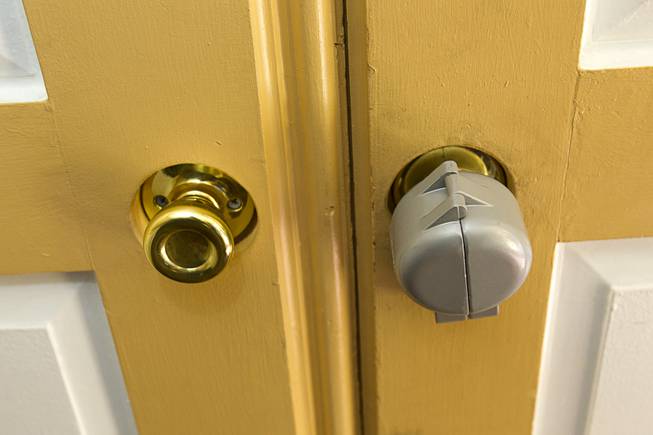
A Kee Blok “donut” is shown over a door knob after an eviction Tuesday, Jan. 22, 2013. Kee Bloks are devices for blocking the access to the doorknob so the evicted tenant cannot return to the apartment.
Published Tuesday, March 17, 2020 | 1:16 p.m.
Updated Tuesday, March 17, 2020 | 7:10 p.m.
Related Content
The Las Vegas Justice Court is suspending eviction proceedings effective Tuesday for at least 30 days, according to an order from Nevada Supreme Court Chief Justice Kristina Pickering signed Tuesday afternoon.
The Las Vegas Justice Court handles eviction proceedings in the city of Las Vegas. In December, it saw 2,631 eviction cases.
The order comes in response to Gov. Steve Sisolak’s declaration of a state of emergency Thursday and in recognition of the need to alter court procedures to protect the public in light of the coronavirus pandemic.
The courts will revisit whether to continue suspending evictions in 30 days depending on the status of the pandemic globally and in Las Vegas, said Grissell Hernandez, acting court administrator. The Las Vegas Justice Court will remain open in the interim, although other court proceedings deemed non-essential will be similarly postponed, Hernandez said.
Landlords can still file eviction complaints, but if tenants do not respond to them, they will not get issued a default eviction by the court within seven to 10 days as is typical, she explained.
“Complaints alone would not prompt an immediate eviction,” Hernandez said.
The news comes hours after the Nevada Housing Rights Coalition called for an immediate end to evictions statewide in light of the coronavirus pandemic’s economic toll. Many people are out of work due to closures of restaurants, bars and casinos across the Las Vegas Valley in addition to cancellations of events and conferences.
“With the financial distress our community is already facing as a result of mass layoffs and drastic reduction in hourly work and tips, families should not lose the homes we so desperately need them to stay in,” the coalition said in a letter to the city councils in Las Vegas, Henderson and North Las Vegas as well as the Clark County Commission.
The Nevada Housing Rights Coalition includes the Nevada Homeless Alliance, the ACLU of Nevada, the Nevada Legal Services Coalition and other justice-oriented groups.
“We’re deeply concerned about the number of households in our state that may be facing eviction as a result of the crisis,” said Emily Paulsen, executive director of the Nevada Homeless Alliance.
The coalition also asked local officials to take steps to protect the homeless, for whom social distancing, as recommended by the Centers for Disease Control to slow the spread of coronavirus, is difficult or impossible. Officials should place unsheltered individuals and families in vacant hotels and motels as well as trailers to reduce crowding in emergency shelters, the coalition wrote.
Police must also stop clearing tents and other makeshift shelters during this time to ensure that those living on the streets do not lose their sole means of social distancing and self-quarantines, the letter added.
In addition to the fact that evictions could drive families into homelessness during a global pandemic, the eviction process necessitates person-to-person contact that puts everyone at risk of contracting or spreading the highly contagious disease, said Bailey Bortolin, policy director of the Nevada Coalition of Legal Service Providers.
“The statutory process for eviction in Nevada requires that when a family receives an eviction notice, their choices are to physically go down to the courthouse and file a response, which triggers the hearing, or move out and be evicted,” Bortolin said.
The letter to the Las Vegas council alludes to the city’s new encampment ordinance, which makes it a misdemeanor to sit, sleep or camp on public rights-of-ways in most neighborhoods in central Las Vegas, near residences and near food processing facilities. The ordinance, which is only enforced when shelters have available beds, aims to connect the homeless to services, but shelters could be hotbeds of contagion, the letter says.
“Living in crowded shelter facilities or in unsheltered locations with poor access to necessary sanitation increases their vulnerability to this illness,” the letter says.
Without swift action across Nevada, Bortolin expects there to be an increase in evictions as there was during the 2008 financial crisis.
“We’ve learned enough lessons to know that if we don’t take preventive measures, this could be a catalyst of our housing crisis and homelessness crisis we’re facing and of the public health crisis,” she said.
In addition to the suspension of evictions in Las Vegas, those who live in public or affordable housing under the purview of the Southern Nevada Regional Housing Authority have received notice that rent payments normally due April 1 will not be due until April 18, said Chad Williams, executive director of the housing authority. He is also in contact with the U.S. Department of Housing and Urban Development to potentially extend that deadline depending on how the pandemic unfolds.
Noting that the housing authority was the largest residential property owner in the state of Nevada, Williams wrote in the email, “I hope that other property management companies follow our lead to keep our community Vegas Strong.”
